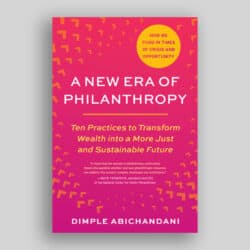Published by The Foundation Centre, 60 pages.
An ongoing concern for charitable foundations and corporate philanthropists is the assessment of the effectiveness of their grants to community organizations. A recent publication of The Foundation Centre brings together in one volume three articles which treat the underlying principles governing evaluations of foundation grants. Each article approaches assessment from a different perspective, that of: the user of the services provided, the agency or group granted the funds and the donor.
An annotated bibliography is included which alone makes the volume an essential for foundation libraries.
The common theme of the publication is the policy and strategy of evaluation. The authors contend that the focus should not be on the research design but rather on the development of a dynamic model that can serve the community, the grantee and the donors. This is best achieved by involving each of these groups in the process.
This volume is well worth reading and will add balance to the other literature, which tends to dwell heavily on techniques and methods, available on this subject.
Reviewed by Carole Mackaay. Assistant to the President. Molson Breweries of Canada Ltd.
Financial Reporting for Non-Profit Organizations A Research Study by the Canadian Institute of Chartered Accountants
250 Bloor St. East, Toronto, Canada M4W 1G5
1980, published by the Canadian Institute of Chartered Accountants, 168 Pages
ISBN 0-88800-0627 Cost: $21.45
This study was initiated by the Accounting Research Committee of The Canadian Institute of Chartered Accountants to answer problems which were encountered by users of financial information provided by non-profit organizations. Confusion existed because of the lack of uniformity in the preparation of financial statements for such organizations and in the degree of disclosure, by diversity in terminology and accounting methods, and by uncertainty as to the accounting principles that should apply, making comparison of financial reports difficult if not meaningless. The terms of reference for this study group were: to identify the users of accounting information provided by non-profit organizations and to establish their needs; to identify the objectives of the accounting information, with particular reference to what should be measured and reported, and to identify applicable accounting principles; to identify areas of differences in accounting principles between nonprofit organizations, government and profit-oriented enterprises, and to identify
differences in terminology; to propose a uniform set of accounting principles and reporting practices appropriate for all non-profit organizations and to identify any special accounting problems and principles unique to particular types of non-profit organizations; to consider the audit implications of the accounting for non-profit organizations; and, to suggest the nature and form of the auditor’s report.
The study includes chapters on the users, objective and qualities of financial information; various forms of financial statements; budget information; cash and accrual bases of accounting; fund accounting; functional accounting; accounting for investments; fixed assets and depreciation; pledges and grants, donated services, materials and facilities; and the audit report for non-profit organizations.
Reviewed by Mary Louise Dickson of the Ontario Bar. Toronto.
The Canadian Book of Charities: The Guide to Intelligent Giving
FRANCES DOBBS, NORMA LAING, YVONNE TRAPMAN
Second edition, published by Mavora Publications Incorporated, Toronto,
184 pages $5.00.
The Canadian Book of Charities is a compilation of information regarding various publicly supported charities who choose to advertise in the book. All communications regarding the book should be addressed to: The Canadian Book of Charities, 124 Westwood Lane, Thornhill, Ontario L4J lRl, Telephone: 416-889-1480.


